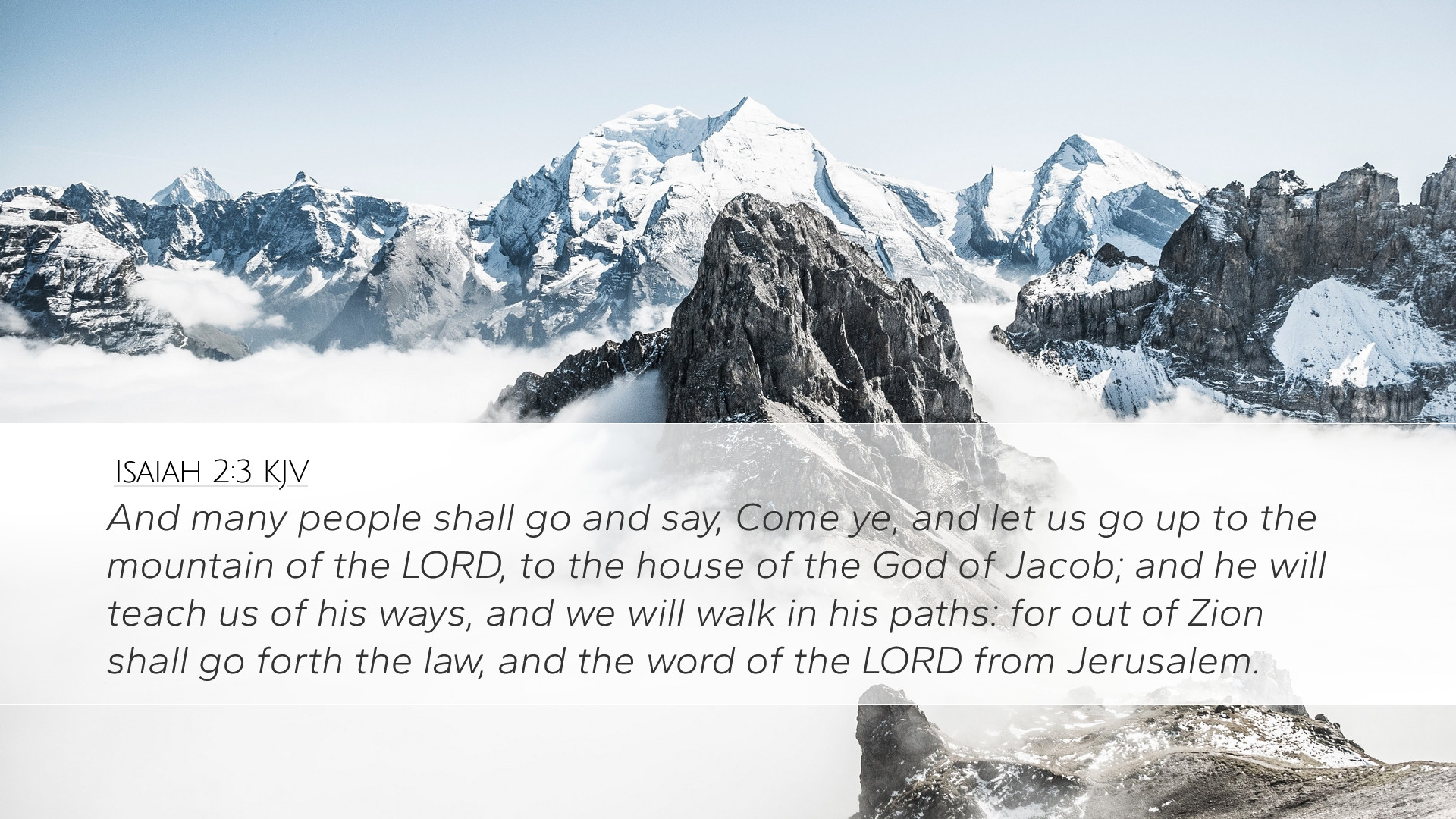Commentary on Isaiah 2:3
Verse: "And many people shall go and say, Come ye, and let us go up to the mountain of the Lord, to the house of the God of Jacob; and he will teach us of his ways, and we will walk in his paths: for out of Zion shall go forth the law, and the word of the Lord from Jerusalem." (Isaiah 2:3)
Introduction
This chapter of Isaiah presents a prophetic vision of a future time in which the nations will seek out the Lord and desire to learn from Him. This commentary synthesizes insights from several public domain sources to examine the theological and practical implications of this verse.
The Call to Worship
Matthew Henry notes that this verse portrays a universal invitation to worship. It reflects the longing of people to ascend to the "mountain of the Lord." The metaphor of a mountain signifies stability and elevation, suggesting that communion with God is a lofty endeavor that requires effort and intention on the part of the believer.
Albert Barnes emphasizes that the call to “come ye” indicates a movement towards spiritual enlightenment and growth. It is imperative here that the people not remain passive but actively seek the Lord’s presence — highlighting both a personal and collective responsibility in the quest for divine truth.
Adam Clarke expands on this by asserting that this invitation encompasses not just the Israelites but all nations. This universal call illustrates the inclusivity of God’s message, which transcends ethnic and cultural boundaries, inviting all to partake in the wisdom and guidance that comes from God.
The Mountain of the Lord
The "mountain of the Lord" is a significant biblical motif. Matthew Henry explains that it symbolizes a place of revelation, power, and divine authority. In the context of Isaiah, it serves as a representation of Zion, the spiritual center of Judaism, which will be exalted in the latter days.
Albert Barnes points out that God’s house and its elevated position signify the supremacy of His jurisdiction over all creation. As the nations are drawn to this mountain, it serves as a reminder that God's truth and righteousness are to be acknowledged and respected worldwide.
Teaching Us His Ways
The latter part of the verse emphasizes the desire to learn from God: "and he will teach us of his ways." Adam Clarke suggests this reflects an acknowledgment of human limitation and a yearning for divine guidance. It highlights the essential role that divine instruction plays in the lives of believers.
Matthew Henry adds that this instruction is not merely academic knowledge but involves moral and practical application. The desire to "walk in his paths" indicates a commitment to living out the teachings received, thereby showcasing the transformative nature of God’s law.
Albert Barnes remarks that the understanding of God’s ways entails both obedience and reverence, showcasing the need for a heart aligned with divine principles. This act of learning is indicative of a deep relationship with God that thrives on intimacy and mutual respect.
Word from Zion
The declaration that "out of Zion shall go forth the law" emphasizes the source of God's truth. Matthew Henry clarifies that Zion is the appointed place from which God’s teachings will emanate, playing a pivotal role in the spiritual edification of all nations.
Adam Clarke highlights that this is a prophetic statement regarding the future ministry of Jesus Christ, who is seen as the fulfillment of the law and an authoritative teacher whose words would resonate from Jerusalem, impacting both Jew and Gentile alike.
Albert Barnes notes that the "word of the Lord from Jerusalem" epitomizes the expectation of a new covenant that supersedes the old, one that emphasizes internal transformation and spiritual renewal over mere external compliance.
Conclusion
This verse from Isaiah encapsulates a vision of hope and unity, inviting believers to rise above their circumstances to pursue a deeper relationship with God. The call to participate in divine teaching underscores the essential nature of growth and discipleship in faith.
As pastors and scholars consider the implications of Isaiah 2:3, they are reminded of the commitment to lead others towards the "mountain of the Lord," encouraging a culture of learning, living according to God's ways, and extending the invitation to all nations to partake in the divine wisdom that comes from Zion. The challenge remains for the faithful to embody this divine teaching and to share it with a world in desperate need of guidance and peace.


